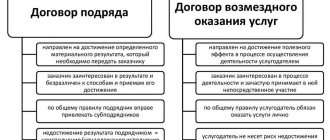Indefinite
What is an open-ended employment contract?
An open-ended employment contract is an employment contract for an indefinite period. This type of agreement is most often used.
For how long can an employment contract of this type be concluded?
An open-ended employment contract is concluded to perform permanent work for a long or indefinite period of time.
Differences from temporary
What is the difference between a fixed-term employment contract and an open-ended one?
- Validity period: a fixed-term employment contract is valid for a certain period , an open-ended one has no end date .
- In a fixed-term agreement, the reason for concluding the agreement must be indicated ; when drawing up an open-ended agreement, this clause is not required .
- An open-ended employment contract is concluded for an indefinite period for cooperation on the basis of a permanent relationship . Urgent allows you to hire an employee for a specific period to perform work, the volume of which is determined in advance.
For example, an open-ended employment contract can be concluded: with a sales manager, engineer, accountant, etc.
Advantages and disadvantages of an employment contract for an indefinite period:
pros
Dismissal requires special circumstances ( an employee’s failure to fulfill his duties, violation of the law, etc. ).
Expert opinion
Gusev Pavel Petrovich
Lawyer with 8 years of experience. Specialization: family law. Has experience in defense in court.
If an employee wants to quit his job, it is enough to notify the employer in writing 2 weeks before leaving (Article 80 of the Labor Code of the Russian Federation) and work out this period.
If there are special grounds and supporting documents, the period of 2 weeks can be reduced with the consent of the employer:
- Moving to another permanent residence.
- Transfer of a spouse to another location for work or service matters.
- Illness or pregnancy.
- Caring for sick family members who, for medical reasons, require constant care.
- Caring for children (up to 14 years old) or a disabled child.
- Start of studies at an educational institution.
Then the date of termination of the employment contract will be considered the day the vacation ends .
The opportunity to cooperate for a long time with qualified and conscientious employees who know their business well.
There is no requirement to indicate the reason why this type of agreement is concluded.
Minuses
There is no right to additional material remuneration , unlike a fixed-term contract.
If an employee leaves due to violation of contractual obligations by the employer, the latter pays compensation in the amount of 2 weeks' earnings .
is not required when dismissing an employee who has given 2 weeks notice to resign at his own request.
Renewal and change
With the consent of both parties, the duration of the fixed-term contract can be extended.
Labor legislation does not have provisions for the transition of an open-ended employment contract to a fixed-term one - this is impossible . When signing a fixed-term agreement with an employee with whom there is already an open-ended agreement, the latter does not lose its force, and all discrepancies in the agreements are interpreted in favor of the employee.
The need to cooperate with a qualified employee over a long period of time to continuously perform certain job functions are the reasons for concluding an open-ended contract.
Signing a fixed-term contract with an employee requires compliance with a number of requirements , in particular, to conclude this kind of agreement between the employee and the employer, it is necessary to have sufficient legal grounds and indicate them in the agreement.
Didn't find the answer to your question? Find out how to solve exactly your problem - call right now:
An employment contract is an agreement that reflects the nature of the relationship between the employee and the employer. Depending on the term of operation, the contract can be fixed-term or indefinite. Taking into account the norms of the current labor legislation, a fixed-term contract has a minimum term, which must certainly be taken into account when drawing up and executing.
General information
A fixed-term contract is a mutual agreement between an employer and a hired worker, concluded for a certain time period. Such a document is drawn up if there are certain grounds.
According to Article 57 of the Labor Code, the contract must necessarily describe the reason for the conclusion of the chosen method of labor relations between employees and employers. If it is absent, or if there is no clearly specified validity period in the contract, the agreement can be considered unlimited.
This means that in fact the employee was hired to perform work duties on a permanent and not temporary basis.
Reasons for conclusion:
- Employment of people with certain medical limitations or retirement age
- Operations in harsh climatic conditions
- The duration of the project is no more than 2 months
- Work in the field of entrepreneurship, where the number of employees is no more than 35 people
- Urgent work related to the prevention or elimination of disasters, natural or man-made accidents
- Employment of higher education students
- Work in the field of media, cinematography, theater or circus arts
- Activities in the legal field in terms provided for by legislative acts
- Employment in the maritime sector
The most common grounds for concluding a fixed-term employment contract were presented above. There are also other situational options in which the signing of such a document is legal and legally appropriate.
An important feature is the fact that the minimum term of a fixed-term employment contract is not limited by any legal act. The restrictions apply exclusively to the maximum contract term, which is 5 years.
The optimal period of validity of the document is determined by the employer, taking into account the nature of the activity, working conditions, risk factors, professional capabilities of the hired specialist and other aspects.
A fixed-term employment contract is a temporary agreement between an employer and an employee, the maximum period is 5 years. After this period has expired, it may be extended.
Does the contract terminate if all obligations under it are fulfilled?
Yes, the contract will terminate, but provided that the obligations under it are properly fulfilled. This follows from the meaning of paragraph 1 of Art. 408 of the Civil Code of the Russian Federation. For example, if the contractor provided services and the customer paid for them, such a contract will be terminated by execution.
The contract will terminate earlier than the period specified in it if, for example, it was concluded for a period until the end of the year, but was executed earlier, in October. In the remaining two months, the agreement will not be valid, executed, or obligate the parties. It also cannot be terminated.
If the obligations were fulfilled improperly, the contract will continue to be valid. And the parties will bear the responsibility stipulated by them, including after the contract expires (clause 4 of article 425 of the Civil Code of the Russian Federation).
Types of fixed-term contracts
The main criterion for the classification of fixed-term employment contracts is the duration of the actual validity of the signed agreement. There are contracts with absolute, relative and conditional validity periods. The choice of the form of agreement depends on the nature of the activity.
For example, a contract with a specific period is most often used when appointing a person to a specific position that is valid only for a clear time period. Relative terms are typical for contracts drawn up in relation to hired workers arriving to perform work with pre-specified, planned terms of completion.
Expert opinion
Gusev Pavel Petrovich
Lawyer with 8 years of experience. Specialization: family law. Has experience in defense in court.
The conditional validity period is relevant for contracts with people appointed to replace specialists who, due to certain circumstances, cannot perform their duties for some time.
There is also a separate type - an agreement that is valid for up to two months. Such an agreement is most often drawn up for seasonal work.
A distinctive feature of this contract is the absence of probationary periods. In addition, such an agreement provides, with the agreement of the employee, the opportunity to engage in work on weekends or holidays, if necessary.
In general, there are different types of fixed-term contracts, the main difference of which is the validity period.
Authorities and agreement
Article 48 of the Labor Code of the Russian Federation allows the agreement to be extended to government bodies within the limits of the obligations that they have assumed. Thus, these power structures perform a supporting role, which is to provide assistance and assistance to the partners of the agreement. These government structures are not obliged to comply with the terms of the agreement and do not have the right to take part in collective disputes.
The new version of Article 48 of the Labor Code of the Russian Federation provides for the procedure for employees to fulfill the terms of the agreement.
According to the article, the conditions specified in the agreement are mandatory for all employees engaged in labor activities with the employer and who have entered into an agreement with him.
Part 6 of Article 48 of the Labor Code of the Russian Federation contains a conflict rule, which applies in cases where an employee enters into several agreements at once. In such situations, the most favorable conditions for the employee are chosen. The employee may stop fulfilling the terms of other agreements. This conflict of laws rule is based on one of the main principles of labor legislation – non-deterioration of the employee’s position.
Contents and design features
At the moment, each type of employment contract can be concluded orally or in writing. Obviously, the written version is preferable, since it is legally valid and serves as a guarantee document responsible for compliance with established rights, both in relation to the employer and the person who is hired to work.
The contract must contain the following information:
What is reflected in the contract
- passport details of the employer and employee
- information about identification documents
- employer identification code
- information about the powers of the employer's representative
- information about the place of work
- information about the employee’s labor function
- date of conclusion and term of validity of the document
- Work mode
- information about financial compensation in case of work injuries
- additional information that reflects the nature of the employment relationship
If any information from the list provided was omitted during the conclusion, the necessary information can be attached as an addition to the main text of the agreement.
For most types of work activity that is suitable in nature for the specifics of fixed-term employment, the employee must be an adult, that is, his age must be at least 18 years old.
Before the concluded contract acquires legal force, the employer’s representative or the employer himself is obliged to familiarize the employee with his responsibilities, conditions, goals and objectives of the work, provide him with a workplace, as well as the tools, equipment and other means necessary to solve the tasks. It is also mandatory to familiarize yourself with the regulations, rights, and safety information.
The contract must be signed by both parties.
Signing a labor cooperation agreement is a legal procedure that must be carried out in writing in order to fulfill the obligations and preserve the rights of both parties.
How to renew the contract
The main reason why there is a need to extend the deadlines is the significant convenience for employers. For most activities, it is more profitable to hire temporary workers, since in this case the employer has fewer obligations than with a permanent agreement.
Normally, the employer is obliged to notify the employee that the contract is no longer valid. This must happen no later than 3 days before the deadline.
However, most often this is done only in cases where the employer has a need to terminate the professional relationship. If there is a need, it is possible to extend the employment contract, but such a procedure can cause many difficulties.
An employee may be dismissed on the basis of termination of the agreement during the last day of the contract. If the dismissal does not occur within the next day, the fixed-term contract automatically becomes indefinite, that is, concluded for an unlimited period.
There is also another extension method. The employer is able to legally dismiss an employee on the last day of the contract, and immediately after the expiration of the agreement, enter into a new one.
From a legal point of view, this method is more expedient and safer, as it allows you to avoid possible penalties from the labor inspectorate.
Upon termination of the contract due to the expiration of the term, if neither the employer nor the employee needs to terminate the employment relationship, the agreement is automatically extended and becomes indefinite.
Relationship with the agent
How is the validity period of an agency agreement regulated in the Civil Code of the Russian Federation? The text of the law specifies the right of the parties to waive it if there is no agreement on the period of its validity. If the agent is declared incompetent in whole or in part, or is declared bankrupt, the agreement is terminated automatically.
At the same time, the agent and the principal are subject to the rules on services. The parties have the right to terminate the relationship at any time, subject to compensation for expenses or losses, depending on who initiated the termination of the relationship.
Often, the termination of the agreement is not associated with losses or expenses of the party and no mutual settlements are made.
Possible violations
Often, during the preparation or termination of a contract, mistakes are made that complicate the labor relationship. In addition, in some situations, if violations are detected, the employer may bear legal liability, which includes penalties or restrictions on work activity.
- The absence in the contract document of a compelling reason due to which it is urgent.
- Drawing up an agreement without taking into account the nature and specific features of work activity, working conditions and other important aspects.
- Failure to notify the employee within 3 days before the end of the agreement period.
- Premature dismissal (before the expiration of the specified periods).
- Multiple extensions of the contract or its re-conclusion upon expiration of the validity period.
If an employee was dismissed prematurely, or dismissed at a time when the fixed-term contract became indefinite, he has the right to file a lawsuit. This usually results in a change in the wording of the dismissal and corresponding compensation payments from the employer.
A fixed-term employment contract is one of the types of employment agreement, and at the same time a form of relationship between the employer and the employee, the main characteristic feature of which is a clearly established period of validity. In accordance with current legal regulations, the contract must be drawn up taking into account the nature of the work activity, its conditions, qualifications and capabilities of the specialist.
The term for concluding a fixed-term employment contract with an employee in accordance with Art. 58 of the Labor Code of the Russian Federation must be specified in the employment contract. Otherwise, the agreement is considered concluded for an indefinite period.
As a general rule, an employee is hired for an indefinite period. However, in exceptional cases determined by law, a contract may include a condition regulating the duration of its validity.
A fixed-term employment contract can be concluded with the following categories of employees:
- Holding positions of temporarily absent employees (for example, on parental leave).
- Workers in Russian companies, but performing their work duties outside the country.
- Workers in elected positions.
- Persons liable for military service who have chosen alternative service instead of military service.
- Workers in law enforcement agencies.
- Civil servants in a number of cases established by law.
In addition, a fixed-term contract is concluded if:
- the work is temporary in nature (can be completed within 2 months or less);
- work can only be performed in a certain climatic season;
- it is necessary to carry out obviously temporary work (expansion of production within a short period of time, going beyond the usual activities of work organization, etc.).
Read more about the reasons for concluding such employment contracts in our other article.
Effect of the agreement on the parties
The collective agreement controls the rights and obligations of the parties. Thus, the rights of workers are regulated by several authorities:
- this Code;
- constituent documents of the organization;
- other federal laws;
- collective agreement.
An employee who has entered into an agreement has the right to be active during the entire term of the agreement in the following forms:
- participation in the production of collective agreements;
- informing the employer on issues: liquidation or reorganization of the enterprise;
- advising the employer on changes to individual clauses of the collective agreement;
- taking into account the opinion of the manager or employee representative in those cases provided for by the collective agreement or this code;
- informing by the employer regarding the interests of employees;
- participation in discussions with the employer on issues regarding the organization and procedure of work and its improvement;
- introducing changes in the technological process that involve changing working conditions and changing the qualifications of workers.
The effect of the agreement on the second participant – employers – depends on several parameters:
- ownership of membership in the association that signed the agreement;
- the possibility of transferring its rights to the union that entered into the agreement. In this case, the union acts on behalf of the member;
- fulfillment of the terms of the agreement is mandatory for him, as well as for all others who joined it of their own free will;
- employers covered by the agreement are required to comply with its terms.
What is the shortest contract period? Consequences of incorrectly specifying the deadline
Labor legislation does not contain a single rule defining the minimum period for concluding a fixed-term employment contract. It follows that such a period does not exist and, if there are legal grounds, the employee and the employer have the right to enter into an employment relationship for a month, a week or even a day.
The absence of a term clause in the employment contract, in accordance with Part 3 of Art.
58 of the Labor Code, indicates that it is not urgent.
When concluding a contract for a specific period, it is necessary to indicate it correctly, because...
exceeding the maximum limits provided by law will entail the consequences specified in Part 4 of Art.
58 TK. This rule establishes that if a person fulfills his duties beyond the deadline in accordance with the contract and job description, then the employment relationship is extended for an indefinite period.
- The term of the employment agreement is important if the employee is hired on one of the grounds provided for by the Labor Code to perform a labor function that is temporary in nature.
- The maximum duration of a contract with an employee depends on the basis for its conclusion and, as a general rule, is limited to five years.
- The minimum limits for the validity of an employment agreement are not established by law.
There are even more materials on the topic in the “Employment contract” section.
When hiring an employee, the manager enters into an employment agreement with him, which outlines the responsibilities of all interested parties. This is a necessary security measure for both parties, the key to a long and legal relationship throughout the entire period of cooperation.
Classification of contracts by terms
Analyzing the civil legislation of the Russian Federation, the following types of agreements can be distinguished (the classification is based on the duration of validity):
- Unlimited contract. The law does not set any requirements for the duration of the contract; the counterparties also did not include such a condition in the document.
- Fixed-term contract. The counterparties agreed on the validity period of the agreement, during which the agreement will be in force.
- Agreements whose duration is limited by law. If there is such a restriction for a specific type of legal relationship, then all agreements between the parties on a longer term of the contract mean nothing.
The presence of a clause on the duration of the contract does not change the procedure for its termination, either unilaterally or by agreement of the parties, since the procedure for termination is prescribed separately in the contract (or at the legislative level), and does not depend on the duration of the agreement.
Grounds for establishing a term in an employment contract
Art. 58 of the Labor Code of the Russian Federation regulates the types of working agreements. If a TD is concluded without a time limit, then it is called unlimited. When specifying a specific period of validity - a fixed-term employment contract (FTA).
Fixing a certain term of the agreement affects the direction of the relationship between the employer and employee, the degree of their responsibility to each other.
The Labor Code of the Russian Federation (Article 59) defines the grounds for concluding a STD. Only if there are compelling reasons, the employer has the right to set the term of the employment contract. Depending on the circumstances, the mandatory time frames of agreements are distinguished:
- in the absence of the main employee, a contract is concluded for the entire period. Upon the employee’s return, it is terminated;
- carrying out seasonal and specific work - lasts until completion or two months;
- performing duties in temporary organizations - while the company exists;
- elective position - for the period of its validity.
If a citizen works outside the state, the TD expires after five years. A person is given six months to complete internship or training. The employer has the right to set an agreement period of up to a year when repair and installation work is carried out by subordinates.
When the parties come to a common opinion, the law gives the right to limit the term of TD to five years in the following cases:
- work is carried out in the Far North region or equivalent to it;
- with people from creative professions, managers at various levels and chief accountants;
- with sailors, students and part-time workers;
- the employer is an individual entrepreneur with 20 to 35 employees;
- competitive position.
With citizens of retirement age or persons with special medical prescriptions, employment agreements end upon expiration of the period specified in the documents issued to them.
In other cases, an agreement is created between the employee and the director without specifying the validity period.
By drawing up the STD, the employer violates the legal side of drawing up the contract. In court proceedings, such a document is recognized as unlimited.
To document any type of relationship, an employee will need the following papers (Article 65 of the Labor Code of the Russian Federation):
- employment history;
- passport;
- diploma or other document confirming qualifications;
- pension and insurance certificate;
- application for a job.
In some cases, additional documents are required. For example, for teachers - a certificate of good conduct.
When does the contract come into force?
As a general rule, an agreement comes into force from the moment of its conclusion (clause 1 of Article 425 of the Civil Code of the Russian Federation). From this moment it becomes binding on the parties. Often the contract comes into force from the moment it is signed by the parties.
How to indicate in a contract that it comes into force from the moment of signing
To do this, write: “This agreement comes into force from the moment it is signed by the parties.” Typically this condition is included in the final provisions of the contract.
Please note that if such a condition exists, the contract will enter into force at the time of signing only if it coincides with the moment of its conclusion established by law. For example, if the conclusion of a contract requires the transfer of property, the presence of such a condition will not change this rule.
Other options for the entry into force of the agreement are also possible. In particular, this is possible if your counterparty avoids concluding a contract that is binding on him and you demand that this be done through the court. In this case, the agreement, as a general rule, will be concluded from the moment the relevant court decision enters into legal force. These are, for example, agreements such as:
- public contract . For example, the insurer avoids concluding a compulsory motor liability insurance agreement (clause 4 of article 445, clause 3 of article 426 of the Civil Code of the Russian Federation, article 1 of the Law on Compulsory Motor Liability Insurance);
- main contract after the preliminary one. In addition, the court may indicate in the decision a different moment for concluding the main contract if you and the counterparty have disagreements regarding its terms (clause 5 of Article 429 of the Civil Code of the Russian Federation).
When the contract comes into force if the date of conclusion specified in it does not coincide with the date of actual signing
In this case, the effective date of the contract is determined depending on whether you can confirm the real date of its signing. If yes, then it is from her that the contract will be considered concluded and the contract will come into force.
As a rule, the actual date can be confirmed if the signatory personally indicated it next to his signature. But most often, a situation arises when the header of the agreement contains one date, but in reality the parties sign the agreement later or earlier and do not make any notes about it. In the absence of evidence that the contract was actually signed on a different date, it is considered that it comes into force on the date indicated in the header. If you and the counterparty did not meet to sign the agreement, but exchanged signed copies, then the agreement will come into force on the day when you receive from the counterparty a previously signed copy of the agreement (clause 1 of article 425, clause 1 of article 433 of the Civil Code of the Russian Federation ).
Duration of the employment contract
The difference between the STD is the determination of the end date of its validity (Article 79 of the Labor Code) or the volume of work performed. It is the employer's responsibility to notify the subordinate of the termination of the employment relationship between them. This must be done in writing three working days in advance.
Expert opinion
Gusev Pavel Petrovich
Lawyer with 8 years of experience. Specialization: family law. Has experience in defense in court.
There is no need to warn the employee when he performs temporary work for an absent employee. Its activity ceases with the departure of a permanent worker.
If the fixed-term employment contract does not indicate the basis for its conclusion, then the manager and the person terminate the working relationship by agreement of the parties.
Minimum and maximum period
The longest period of validity of an employment contract in accordance with Art. 58 of the Labor Code of the Russian Federation is five years. Upon expiration of the approved period, if necessary, it is extended or a new TD is issued.
Due to the variety of services provided and types of work, the law does not regulate the minimum time for TD.
Features of the lease agreement
The validity period of a lease agreement under the Civil Code of the Russian Federation is determined by the parties or regulations. If the parties to the agreement do not reach a common opinion regarding the duration of its validity, then it is considered signed for an indefinite period. It is enough for a party to send a letter of refusal one month before the planned termination of the transaction.
For a land plot, the maximum lease period is 49 years. If neither party has refused the contract, it is terminated after the allotted time. If a shorter time period is set, the same rule applies. If the parties have the intention, they sign a new agreement.
The tenant has the right to ask the owner of the property to sign a new agreement with him if he has complied with the previously reached agreements in all good faith. It is permissible to sign a new deal with changed terms.
The law states that the tenant’s continued use of the property without the owner’s objections gives reason to believe that the agreement will be renewed on the same terms. If the property owner does not want to renew the agreement, he sends a letter in advance to prepare the property for transfer. The nuances don't end there. For example, the transfer into temporary possession of territories allocated for large-scale construction.
When an employment contract can be concluded for an indefinite period
An open-ended agreement between an employer and an employee is drawn up in the case of permanent employment on a long-term basis. It is concluded within three days (Article 67 of the Labor Code).
The circumstances for BS are:
- availability of a vacancy in the company;
- the employee’s ability to fulfill the organization’s requirements in full;
- the employer's desire to accept a citizen.
The package of documents for registration is prepared in the same way as when concluding a fixed-term contract.
If additional benefits are available, the employee must provide supporting documents:
- birth certificates of children - for large families;
- MSEC certificate - for people with disabilities;
- documents about existing dependents.
If the legality of the relationship is violated, a fine is imposed on the enterprise. Incorrect drafting of a contract for a citizen entails a reduction in social rights.
Industry agreements
After concluding an agreement between industries, absolutely all employers have the right to join it. Affiliation must be voluntary and sealed by an agreement between employers and trade union associations that have expressed a desire to extend the agreement to the joining organizations.
The conclusion of industry agreements allows the agreement to be extended to all employers in the industry. The decision to extend the agreement is made by the head of the local branch of the executive branch, which performs the functions of developing state regulations in the field of labor. In most cases, the role of the federal body is played by the federal labor and employment service.
This rule allows the same or similar procedures to be extended to employees of the same production organizations.
The extension of the intersectoral agreement occurs on a voluntary basis. The social partners express their desire to join the agreement. According to the new version of Article 48 of the Labor Code of the Russian Federation, the employer has the right to familiarize himself with the contents of the agreement before concluding, which means that it must be published before the publication of the proposal for the agreement. The procedure for publication of both the proposal and the agreement is determined by the Ministry of Health and Social Development of Russia with the participation of the RTK.









